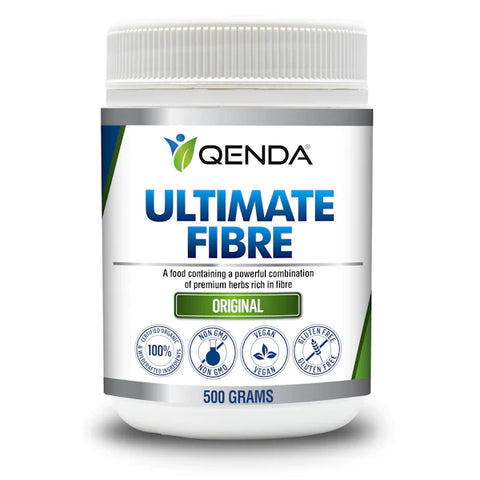A tight, full belly? Nobody wants that! It can be uncomfortable or even downright annoying sometimes.
We often take our digestive health for granted until there is a problem. And once there is a problem, it can be tough to know where to turn. There are many different causes of bloating and digestive issues, so it is crucial to find a comprehensive approach that addresses the root causes.
In this blog post, we will explore the best foods and digestive support supplements for bloating and digestive needs.

We will also provide tips on how to make changes to your diet and lifestyle in order to support optimal digestive health. We've compiled a list of foods and supplements that can help get rid of bloat and promote healthy digestion:
Fibre: There are many different types of fibre, but they can generally be divided into two categories: soluble and insoluble. Both types are important for keeping the digestive system healthy, but they have different functions.
The soluble fibre forms gel-like substances when it is dissolved in water. It is found in foods like oatmeal, flaxseed, and apples. This type of fibre is beneficial because it slows down digestion and helps to regulate blood sugar levels. It can also help to lower cholesterol and promote gut health by providing food for the friendly bacteria that live in the intestines.
Insoluble fibre does not dissolve in water and passes through the digestive system relatively unchanged. It is found in foods like wheat bran, whole grains, and vegetables. This type of fibre adds bulk to stools and helps keep things moving through the digestive system. It can also help prevent constipation and other gastrointestinal problems.
Supplements can also be a good source of both types of fibre.
Probiotics: Probiotics are live microorganisms that are similar to those already present in our gut. They can be found in fermented foods like yoghurt and sauerkraut, or in supplements. Probiotics help restore the natural balance of bacteria in our gut, which can be helpful if you're experiencing bloating or other digestive issues.
There are many different types of probiotics, and it is crucial to choose one that is tailored to your specific needs. For example, if you're taking antibiotics, you may want a probiotic that contains Lactobacillus acidophilus because L.Acidophilus is effective at restoring gut flora after antibiotic use.
If you're struggling with bloating, gas, or constipation, consider adding a probiotic to your diet. Probiotics can help alleviate these symptoms by restoring the natural balance of bacteria in your gut.
Prebiotics: Prebiotics are a type of dietary fibre that acts as fuel for the good bacteria in your gut. They can be found in a variety of foods, including onions, garlic, bananas, oats, and flaxseeds. Probiotics are live bacteria that are similar to the good bacteria found in your gut. They are available as supplements or in fermented foods such as yogurt, sauerkraut, and kimchi.
To maintain a healthy gut microbiome, probiotics and prebiotics work together. The good bacteria in your gut grow stronger when you consume foods containing prebiotics. This prevents digestive problems caused by bad bacteria. Probiotics also help break down food and extract nutrients from it. This helps your body absorb more nutrients and keeps you regular.
If you’re experiencing bloating, gas, or other digestive problems, adding more prebiotic-rich foods to your diet may help. You can also try taking a probiotic supplement to see if that helps relieve your symptoms.
Antioxidants: Antioxidants are one of the most crucial nutrients for bloating and digestive needs. Antioxidants scavenge harmful toxins and byproducts that can damage cells, leading to inflammation.
Foods rich in antioxidants include fruits and vegetables like berries, dark leafy greens, and tomatoes. You can also get antioxidants from supplements like vitamin C, vitamin E, and green tea extract.
Herbal Teas: Herbal teas are the best option for those dealing with digestive issues. There are many different herbal teas that can help with bloating and digestive issues. Some of the most popular include chamomile, ginger, mint, and licorice. Each of these herbs has unique properties that can help to ease stomach pain, reduce gas and bloating, and promote healthy digestion.
Conclusion: There are many different possible causes of bloating, and unfortunately, there is no one-size-fits-all solution. However, there are certain foods and supplements that can help to ease bloating and improve digestive function. If you are suffering from chronic bloating or other digestive issues and are looking for health supplements. There is a wide selection of organic supplements available at Healthbar.
